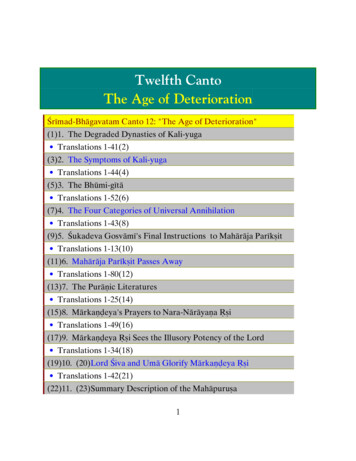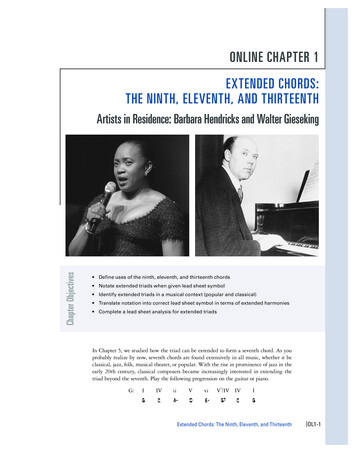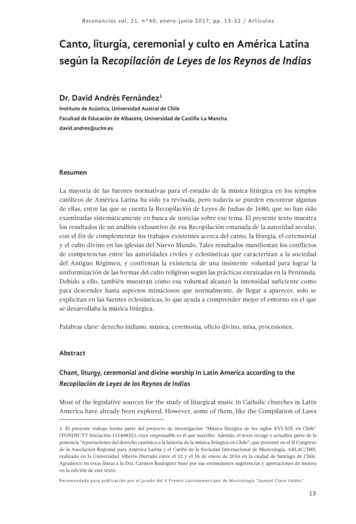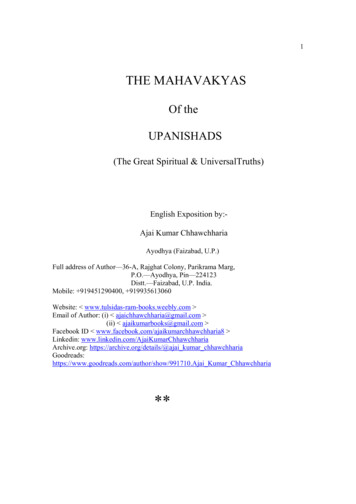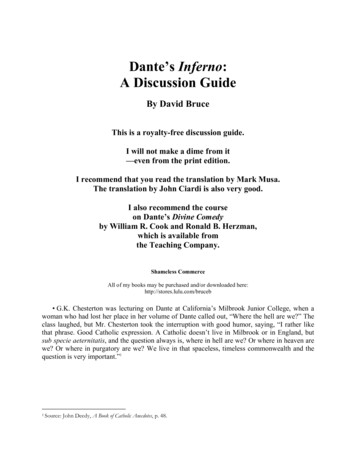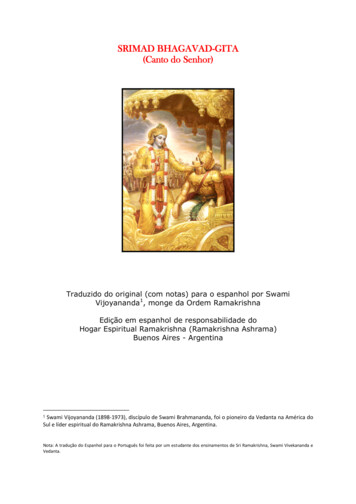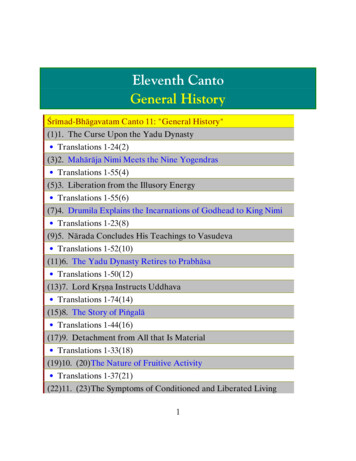
Transcription
Eleventh CantoGeneral HistoryÇrémad-Bhägavatam Canto 11: "General History"(1)1. The Curse Upon the Yadu Dynasty Translations 1-24(2)(3)2. Mahäräja Nimi Meets the Nine Yogendras Translations 1-55(4)(5)3. Liberation from the Illusory Energy Translations 1-55(6)(7)4. Drumila Explains the Incarnations of Godhead to King Nimi Translations 1-23(8)(9)5. Närada Concludes His Teachings to Vasudeva Translations 1-52(10)(11)6. The Yadu Dynasty Retires to Prabhäsa Translations 1-50(12)(13)7. Lord Kåñëa Instructs Uddhava Translations 1-74(14)(15)8. The Story of Piìgalä Translations 1-44(16)(17)9. Detachment from All that Is Material Translations 1-33(18)(19)10. (20)The Nature of Fruitive Activity Translations 1-37(21)(22)11. (23)The Symptoms of Conditioned and Liberated Living1
Entities Translations 1-49(24)(25)12. (26)Beyond Renunciation and Knowledge Translations 1-24(27)(28)13. (29)The Haàsa-avatära Answers the Questions of the Sonsof Brahmä Translations 1-42(30)(31)14. (32)Lord Kåñëa Explains the Yoga System to Çré Uddhava Translations 1-46(33)(34)15. (35)Lord Kåñëa's Description of Mystic Yoga Perfections Translations 1-36(36)(37)16. (38)The Lord's Opulence Translations 1-44(39)(40)17. (41)Lord Kåñëa's Description of the Varëäçrama System Translations 1-58(42)(43)18. (44)Description of Varëäçrama-dharma Translations 1-48(45)(46)19. (47)The Perfection of Spiritual Knowledge Translations 1-45(48)(49)20. (50)Pure Devotional Service Surpasses Knowledge andDetachment Translations 1-37(51)(52)21. (53)Lord Kåñëa's Explanation of the Vedic Path Translations 1-43(54)(55)22. (56)Enumeration of the Elements of Material Creation Translations 1-61(57)(58)23. (59)The Song of the Avanté Brähmaëa2
Translations 1-61(60)(61)24. (62)The Philosophy of Säìkhya Translations 1-29(63)(64)25. (65)The Three Modes of Nature and Beyond Translations 1-36(66)(67)26. (68)The Aila-gétä Translations 1-35(69)(70)27. (71)Lord Kåñëa's Instructions on the Process of DeityWorship Translations 1-55(72)(73)28. (74)Jïäna-yoga Translations 1-44(75)(76)29. (77)Bhakti-yoga Translations 1-49(78)(79)30. (80)The Disappearance of the Yadu Dynasty Translations 1-50(81)(82)31. (83)The Disappearance of Lord Çré Kåñëa Translations 1-28(84)Appendix1. The Curse Upon the Yadu DynastyThis chapter gives a hint of the destruction of the Yadu dynasty, whichtook place owing to the appearance of an iron club. Hearing this narration is a3
great impetus for becoming detached from the material world.Lord Çré Kåñëa expertly arranged the great Kurukñetra battle between theKurus and the Päëòavas and thus removed to a great extent the earth's burden.But the Supreme Lord, whose influence is inconceivable, was not yet satisfied,because of the continued presence of the undefeatable Yadu family. The Lorddesired to bring about the destruction of the Yadu dynasty so that He couldcompletely wind up His pastimes on the earth and go back to His own abode.Using the pretense of a curse by an assembly of brähmaëas, He withdrew Hisentire dynasty from the surface of the earth.By Çré Kåñëa's desire, many great sages, headed by Närada and Viçvämitra,assembled at the holy place named Piëòäraka, near the city of Dvärakä. Theyoung boys of the Yadu family, absorbed in a playful mood, also arrived there.These boys dressed Sämba in the guise of a pregnant woman about to givebirth and inquired from the sages about the fruitfulness of Sämba's so-calledpregnancy. The sages cursed the mocking boys by saying, "She will give birth toa club that will destroy your family." The Yadus, frightened by this curse,immediately lifted the garment from Sämba's abdomen and found a club.Hurrying to the assembly of Ugrasena, the King of the Yadus, they offered areport of everything that had taken place. Fearing the brähmaëas' curse,Yaduräja Ugrasena ordered the club ground to powder and thrown into theocean. Within the ocean, a fish swallowed the last remaining lump of iron, andthe waves carried all the bits of ground powder to the shore, where they wereimplanted and eventually grew into a grove of canes. Fishermen caught thefish, and a hunter named Jarä used the iron lump found in its belly to fashionan arrow. Although the Supersoul, Lord Çré Kåñëa, understood what washappening, He did not wish to do anything to counteract it. Rather, in theform of time He sanctioned these events.TEXT 14
aIzAuk( ovaAcak{(tvaA dE"tyavaDaM k{(SNA:s ar"AmaAe yaäu"iBava{Rta:BauvaAe'vataAr"yaà"ArM"jaivaïM" janayana, k(ilama,çré-çuka uväcakåtvä daitya-vadhaà kåñëaùsa-rämo yadubhir våtaùbhuvo 'vatärayad bhäraàjaviñöhaà janayan kalimSYNONYMSçré-çukaù uväca—Çré Çuka said; kåtvä—having performed; daitya—of thedemons; vadham—the killing; kåñëaù—Lord Kåñëa; sa-rämaù—accompaniedby Balaräma; yadubhiù—by the Yadus; våtaù—surrounded; bhuvaù—of theearth; avatärayat—caused to be lessened; bhäram—the burden;javiñöham—most sudden, leading to violence; janayan—raising; kalim—a stateof quarrel.TRANSLATIONÇré Çukadeva Gosvämé said: Lord Çré Kåñëa, accompanied by Balaräma andsurrounded by the Yadu dynasty, executed the killing of many demons. Then,further to remove the burden of the earth, the Lord arranged for the greatBattle of Kurukñetra, which suddenly erupted in violence between the Kurusand the Päëòavas.PURPORT5
The Eleventh Canto of Çrémad-Bhägavatam begins with a reference to thepastimes executed by Lord Çré Kåñëa in the Tenth Canto. The beginning ofthe Tenth Canto describes that when the earth was overburdened bydemoniac rulers, the personified earth, Bhümi, approached Lord Brahmä withtears in her eyes, begging for relief, and Brahmä immediately went with thedemigods to approach the Supreme Lord in His form of Kñérodakaçäyé Viñëu.As the demigods waited respectfully on the shore of the milk ocean, theSupreme Lord announced through Brahmä that He would soon incarnate onearth and that the demigods should also descend to assist in His pastimes. Thusfrom the very beginning of Lord Kåñëa's appearance it was understood that Hewould descend to the earth to remove the demons.As Çréla Prabhupäda states in his commentary to Bhagavad-gétä (16.6), thosewho agree to obey the injunctions of revealed scriptures are known asdemigods, whereas those who defy the orders of Vedic scriptures are known asasuras, or demons. The Vedic literatures are presented within the universe forthe guidance of the conditioned souls, who are trapped under the three modesof material nature and who are therefore rotating in a continuous cycle ofbirth and death. By strictly adhering to the Vedic injunctions, we can easilysatisfy our material needs and at the same time make tangible progress on thepath back home, back to Godhead. Thus we can achieve an eternal life of blissand knowledge in the Lord's own abode simply by obeying the Lord'sinstructions as they are presented in Vedic literatures such as Bhagavad-gétäand Çrémad-Bhägavatam. The demons, however, minimize or even mock theabsolute authority of the Supreme Lord and His teachings. Because theseasuras envy the sovereign status of the Supreme Personality of Godhead, theyminimize the importance of the Vedic scriptures, which emanate directly fromthe breathing of the Lord. The demons establish a society governed by theirown concocted whims and inevitably create chaos and misery, especially forpious living entities who sincerely desire to follow the will of God.Lord Çré Kåñëa states in Bhagavad-gétä that when there is a predominanceof such chaotic, irreligious societies on the earth, He personally descends to6
rectify the imbalance. Thus from the very beginning of His transcendentalinfancy, Kåñëa systematically killed the powerful asuras, or demons, who werean intolerable burden for the earth. Lord Çré Kåñëa was assisted by His brother,Balaräma, who is also the Supreme Personality of Godhead. Although God isone, He can expand Himself to enjoy in many forms at once. That is Hisomnipotence. And the first such expansion is Balaräma, or Baladeva. Balarämakilled many noteworthy demons, including Dhenukäsura, Dvivida and theenvious Rukmé. Kåñëa was also accompanied by the members of the Yadudynasty, many of whom were demigods who had descended to assist the Lord.Çréla Bhaktisiddhänta Sarasvaté Öhäkura, however, has revealed thatalthough many demigods had taken birth in the Yadu dynasty to assist theLord, some members of the Yadu dynasty were actually inimical toward Kåñëa.Because of their mundane vision of the Lord, they considered themselves to beon the same level as Kåñëa. Having taken birth in the family of the SupremePersonality of Godhead Himself, they had inconceivable strength, and thusthey misunderstood Kåñëa's supreme position. Having forgotten that Kåñëa isthe Supreme Personality of Godhead, they would constitute a great burden,and consequently it was necessary for Kåñëa to remove them from the earth.There is a popular saying that familiarity breeds contempt. To destroy thecontemptuous members of His own dynasty, the Lord caused a quarrel amongthem. For this purpose, He arranged for Närada and other sages to displayanger against the Kärñëas, the members of His family. Although many Yaduswho were devoted to Kåñëa were apparently killed in this fratricidal war, LordKåñëa actually returned them to their original positions as universal directors,or demigods. It is the Lord's promise in Bhagavad-gétä that He will alwaysprotect those who are favorable to His service.Çréla Viçvanätha Cakravarté Öhäkura, in his commentary on this verse, hasgiven a summary of the entire Eleventh Canto as follows. Chapter Onedescribes the beginning of the mauñala-lélä, or the prelude to the destruction ofthe Yadu dynasty. Chapters Two through Five describe the conversationsbetween the nine Yogendras and King Nimi. Chapter Six describes the prayers7
of Brahmä, Çiva and other residents of heaven. Chapters Seven throughTwenty-nine present the conversation between Kåñëa and Uddhava that isknown as the Uddhava-gétä. Chapter Thirty describes the withdrawal of theYadu dynasty from the earth. The final chapter describes the disappearance ofLord Kåñëa.TEXT 2yae k(AeipataA: s aubaò" paANx"]s autaA: s apa tvaA inaimaÔaimatare"tar"ta: s amaetaAna,h"tvaA na{paAiªar"h"r"itºaitaBaAr"maIzA:ye kopitäù su-bahu päëòu-sutäù sapatnairdurdyüta-helana-kaca-grahaëädibhis tänkåtvä nimittam itaretarataù sametänhatvä nåpän niraharat kñiti-bhäram éçaùSYNONYMSye—they who; kopitäù—were angered; su-bahu—excessively, time and timeagain; päëòu-sutäù—the sons of Päëòu; sapatnaiù—by their enemies;duù-dyüta—by duplicitous gambling; helana—insults; kaca-grahaëa—grabbingthe hair (of Draupadé); ädibhiù—and other impetuses; tän—them mediatecause;itara-itarataù—confronting one another on opposite sides; sametän—allassembled; hatvä—killing; nåpän—the kings; niraharat—took away once andfor all; kñiti—of the earth; bhäram—the burden; éçaù—the Supreme Lord.8
TRANSLATIONBecause the sons of Päëòu were enraged by the numerous offenses of theirenemies, such as duplicitous gambling, verbal insults, the seizing of Draupadé'shair, and many other cruel transgressions, the Supreme Lord engaged thosePäëòavas as the immediate cause to execute His will. On the pretext of theBattle of Kurukñetra, Lord Kåñëa arranged for all the kings who wereburdening the earth to assemble with their armies on opposite sides of thebattlefield, and when the Lord killed them through the agency of war, the earthwas relieved of its burden.PURPORTThe Päëòavas were repeatedly harassed by their enemies, such asDuryodhana and Duùçäsana. As innocent young princes, the Päëòavas had noenemy, but Duryodhana was constantly plotting against his helpless cousins.The Päëòavas were sent to a house of lac, which was later burned to theground. They were administered poison, and their chaste wife Draupadé waspublicly insulted when her hair was pulled and an attempt was made to stripher naked. Throughout these dangers, Lord Çré Kåñëa constantly protected thePäëòavas, who were fully surrendered to Him and who knew no shelter otherthan Him.In this verse the word itaretarataù is significant. Previous to the Battle ofKurukñetra, Kåñëa had personally killed many demons, including Pütanä, Keçé,Aghäsura and Kaàsa. Now, Kåñëa wanted to complete His mission ofremoving the earth's burden by killing the remaining impious persons. But asstated here, kåtvä nimittam: the Lord did not personally kill, but empoweredHis devotees Arjuna and the other Päëòavas to remove the impious kings.Thus acting personally and through His immediate expansion Balaräma, aswell as by empowering His pure devotees such as the Päëòavas, Kåñëa fullydisplayed the pastimes of the yugävatära by reestablishing religious principles9
and ridding the world of demons. Although the general purpose of theKurukñetra battle was to kill the demons, by Kåñëa's arrangement some greatdevotees such as Bhéñma also appeared to be inimical toward the Lord. But asdescribed in the First Canto of Çrémad-Bhägavatam (1.9.39) by the words hatägatäù svarüpam, many great devotees played with the Lord as enemies andupon being killed by Kåñëa returned immediately to His abode in the spiritualsky in their original spiritual bodies. Because God is absolute, by His killing Hesimultaneously removes the demons from the earth and encourages His puredevotees.TEXT 3BaUBaAr"r"Ajapa{tanaA yaäu"iBainaRr"syagAuæaE: au gAtaAe'pyagAtaM ih" BaArM"yaâAd"vaM ku(lamah"Ae @ivaSa maAstaebhü-bhära-räja-påtanä yadubhir nirasyaguptaiù sva-bähubhir acintayad aprameyaùmanye 'vaner nanu gato 'py agataà hi bhäraàyad yädavaà kulam aho aviñahyam ästeSYNONYMSbhü-bhära—existing as the burden of the earth; räja—of the kings;påtanäù—the armies; yadubhiù—by the Yadus; nirasya—eliminating;guptaiù—protected; sva-bahubhiù—by His own arms; acintayat—Heconsidered; aprameyaù—the unfathomable Lord; manye—I think; avaneù—ofthe earth; nanu—one may say; gataù—it is gone; api—but; agatam—it is notgone; hi—indeed; bhäram—the burden; yat—because; yädavam—of Yadus;10
kulam—the dynasty; aho—ah; aviñahyam—intolerable; äste—remains.TRANSLATIONThe Supreme Personality of Godhead used the Yadu dynasty, which wasprotected by His own arms, to eliminate the kings who with their armies hadbeen the burden of this earth. Then the unfathomable Lord thought to Himself,"Although some may say that the earth's burden is now gone, in My opinion itis not yet gone, because there still remains the Yädava dynasty itself, whosestrength is unbearable for the earth."PURPORTÇréla Bhaktisiddhänta Sarasvaté Öhäkura has remarked in this regard thatalthough ordinary people might think that the Lord had now removed theburden of the earth by killing the demons, reestablishing dharma, and so on,Lord Çré Kåñëa Himself could detect that there was further danger from theirreligious activities of His own family members who were acting improperly. Itis stated in Çrémad-Bhägavatam that a just king will refuse to punish his ownenemy if his enemy is innocent but will punish his own son if his son actuallydeserves punishment. Thus although in the eyes of the world the members ofthe Lord's own dynasty are always worshipable, Lord Kåñëa detected that bytheir intimate association with Him some members of the Yadu dynasty hadbecome indifferent to His will. Since such whimsical members of the Yadudynasty could act freely, being relatives of the Supreme Personality ofGodhead, they would surely cause great misfortune for the world, and foolishpersons would take such whimsical behavior to be the will of Kåñëa. Thus theLord, whose desires are inconceivable, began to consider the need toannihilate the indifferent, contemptuous members of the Yadu family.From the viewpoint of ordinary persons, all the demons had been killed bythe Supreme Lord's pastimes in Dvärakä and Mathurä, as well as by the Battleof Kurukñetra, and the earth was now free of its burden. Nevertheless, to free11
the earth from the remaining burden of His own puffed-up family members,Lord Çré Kåñëa transferred them away from the earth by causing a fratricidalquarrel among them. In this way He prepared for His own disappearance fromthe earth.Çrédhara Svämé has pointed out that the word bähubhiù, "by His arms," isused in the plural (rather than the dual) to indicate that the Lord caused thedestruction of the Yadu dynasty in His four-armed form. The original form ofKåñëa as Govinda is two-armed, but it was by the plenary portion of thefour-armed Näräyaëa that the Lord killed all the demons on the earth andultimately removed the burdensome members of His own family. It may beasked, If certain members of the Yadu family had become indifferent to thewill of the Lord, why didn't they oppose the Lord in His plan to remove themfrom the earth? Therefore the word aprameyaù is used, which indicates that itis impossible for anyone, even the Lord's own family members, to understandHis will completely.Çréla Jéva Gosvämé has given another reason for the destruction of the Yadudynasty. He emphasizes that the activities of the Supreme Personality ofGodhead should never be taken to be ordinary material activities. Nor are theLord's associates ordinary persons. Although Lord Kåñëa apparently incarnateswithin this world for some time and then goes away, it should be understoodthat the Supreme Lord is eternally situated with His entourage in His variousabodes in the spiritual sky, such as Çré Gokula, Mathurä and Dvärakä. Themembers of the Yadu dynasty are eternal associates of the Lord, and thereforethey cannot bear to be separated from the Lord. Since Kåñëa was preparing togive up His earthly pastimes, if He were to leave the Yadu dynasty on the earththey would surely become so disturbed by His absence that in their highlyagitated state of mind they would trample and destroy the earth. Therefore,Kåñëa arranged the disappearance of the Yadu dynasty prior to His owndisappearance.Çréla Jéva Gosvämé concludes that ultimately the members of the Yadudynasty are never to be considered irreligious. Vaiñëava äcäryas have12
mentioned that the story of the disappearance of the Yadu dynasty is especiallymeant to help the conditioned souls achieve liberation from the bondage ofmaterialistic life. Within the three worlds there were none as powerful andopulent as the Yadu dynasty. The Supreme Personality of Godhead is thepossessor of unlimited opulences—beauty, strength, knowledge, fame and soon—and the members of the Yadu dynasty, being the personal associates ofthe Lord, were also endowed with inconceivable opulences. Therefore, whenwe see how a fratricidal war suddenly deprived the members of the Yadudynasty of all of their earthly possessions and even their lives, we canunderstand that there is no permanent position within this material world. Inother words, although the members of the Yadu dynasty are eternal associatesof the Lord and were immediately transferred to another planet where theLord was appearing, their sudden disappearance through fratricidal war ismeant to impress upon the conditioned souls the temporary nature of thisworld. Therefore, the apparent indifference or enmity of certain members ofthe Yadu dynasty toward Kåñëa should not be taken to be actual irreligion ontheir part. The entire situation was arranged by Lord Kåñëa to teach a lesson tothe conditioned souls. In this connection Çréla Jéva Gosvämé has cited severalverses from the Bhägavatam to prove that the members of the Yadu dynastyachieved their exalted birth in the Lord's own family by innumerable piousactivities and by complete absorption in thought of Lord Kåñëa. In fact it issaid that in sleeping, sitting, walking and speaking, they were unable toremember their own selves, because they were simply thinking of Kåñëa.In the First Canto of Çrémad-Bhägavatam (1.15.33), Çréla Prabhupäda hascommented as follows on the disappearance of the Yadu dynasty: "The settingof the sun does not mean the end of the sun. It means that the sun is out of oursight. Similarly, the end of the mission of the Lord on a particular planet oruniverse only means that He is out of our sight. The end of the Yadu dynastyalso does not mean that it is annihilated. It disappears along with the Lord, outof our sight."13
TEXT 4naEvaAnyata: pair"BavaAe'sya Bavaetk(TaiÂana,mats aM ayasya ivaBavaAeªah"nasya inatyama,@nta: k(ilaM yaäu"ku(lasya ivaDaAya vaeNAustambasya vai¶"imava zAAintamaupaEima DaAmanaivänyataù paribhavo 'sya bhavet kathaïcinmat-saàçrayasya vibhavonnahanasya nityamantaù kalià yadu-kulasya vidhäya veëustambasya vahnim iva çäntim upaimi dhämaSYNONYMSna—not; eva—certainly; anyataù—from another cause; paribhavaù—defeat;asya—of this (dynasty); bhavet—there can be; kathaïcit—by any means;mat-saàçrayasya—which has fully taken shelter of Me; vibhava—with itspower; unnahanasya—unrestricted; nityam—always; antaù—within; �ya—inspiring;veëu-stambasya—of a clump of bamboo plants; vahnim—a fire; iva—as;çäntim—peace; upaimi—I shall achieve; dhäma—My eternal personal abode.TRANSLATIONLord Kåñëa thought, "No outside force could ever bring about the defeat ofthis family, the Yadu dynasty, whose members have always been fullysurrendered to Me and are unrestricted in their opulence. But if I inspire aquarrel within the dynasty, that quarrel will act just like a fire created from thefriction of bamboo in a grove, and then I shall achieve My real purpose andreturn to My eternal abode."14
PURPORTEven though Lord Kåñëa wanted to arrange for the disappearance of themembers of the Yadu dynasty, He could not personally kill them, as He hadkilled many demons, because the Yadu dynasty was His own family. One mightask why Lord Kåñëa did not arrange for them to be killed by others. Thereforeit is stated in this verse, naivänyataù paribhavo 'sya bhavet kathaïcit: becausethe Yadu dynasty was the Lord's own family, no one within the universe wascapable of killing them, not even the demigods. In fact, Viçvanätha CakravartéÖhäkura points out that no one within the universe was capable of eveninsulting the members of the Yadu dynasty, what to speak of defeating orkilling them. The reason is given here by the words mat-saàçrayasya. Themembers of the Yadu dynasty had fully taken shelter of Kåñëa, and thereforethey were always under the personal protection of the Lord. It is stated, märekåñëa räkhe ke, räkhe kåñëa märe ke: If Kåñëa protects someone, no one can killhim, and if Kåñëa wants to kill someone, no one can save him. Kåñëa hadoriginally requested all of His associates, along with the demigods, to appear onthe earth to assist Him in His pastimes. Now that His pastimes were coming toan end on this particular planet and would be transferred to another planet inanother universe, Kåñëa wanted to remove all of His associates from the earthso that in His absence they would not constitute a burden. Since the powerfulYadu dynasty, being the Lord's personal family and army, could not possibly bedefeated by anyone, Kåñëa arranged an internal quarrel, just as the wind in abamboo forest sometimes rubs the bamboos together and creates a fire thatconsumes the entire forest.Çréla Bhaktisiddhänta Sarasvaté has pointed out that ordinary people,hearing of the adventures of the Yadu family, might think that the heroes ofthe Yadu dynasty are as worshipable as Kåñëa or that they are independentcontrollers. In other words, people polluted by Mäyäväda philosophy might seethe Yadu dynasty as being on the same level as Kåñëa. Therefore, to establishthat even the most powerful living entity can never equal or surpass the15
Supreme Lord, Kåñëa arranged for the destruction of the Yadu dynasty.TEXT 5WvaM vyavais ataAe r"Ajana,s atyas aÆÿlpa wRìr":zAApavyaAjaena iva‘aANAAMs aÃaœe" svaku(laM ivaBau:evaà vyavasito räjansatya-saìkalpa éçvaraùçäpa-vyäjena vipräëäàsaïjahre sva-kulaà vibhuùSYNONYMSevam—in this way; vyavasitaù—deciding for certain; räjan—O King;satya-saìkalpaù—whose desire always proves true; éçvaraù—the Supreme Lord;çäpa-vyäjena—by the pretext of a curse; vipräëäm—of brähmaëas;saïjahre—withdrew; sva-kulam—His own family; vibhuù—the Almighty.TRANSLATIONMy dear King Parékñit, when the supreme almighty Lord, whose desirealways comes to pass, had thus made up His mind, He withdrew His own familyon the pretext of a curse spoken by an assembly of brähmaëas.PURPORTÇréla Bhaktisiddhänta Sarasvaté Öhäkura has made a very importantcomment on this verse. He states that since the intentions of the Supreme16
Lord, Kåñëacandra, are always perfect, it was certainly in consideration of thegreatest benefit for the entire world that He destroyed His own family on thepretext of a curse by brähmaëas. In this connection, Bhaktisiddhänta SarasvatéÖhäkura has shown a parallel in the pastimes of Çré Caitanya Mahäprabhu,who is Kåñëa Himself appearing as His own devotee.Lord Caitanya appeared along with His first plenary expansion, known asLord Nityänanda Prabhu, and with Lord Advaita Prabhu. All threepersonalities—Caitanya Mahäprabhu, Nityänanda Prabhu and AdvaitaPrabhu—are accepted by Vaiñëava äcäryas to be in the category ofviñëu-tattva, the full status of the Supreme Personality of Godhead. Thesethree Personalities of Godhead perceived that in the future Their so-calledseminal descendants would get undue recognition and thus, being puffed up,would commit grave offenses against those who were actually Vaiñëava gurusor representatives of the Lord.Every living being is part and parcel of the Supreme Lord, as stated in theBhagavad-gétä (mamaiväàçaù). Every living entity is originally a son of God,yet to execute His pastimes the Lord selects certain highly qualified livingentities whom He allows to take birth as His personal relatives. But thoseliving entities who appear as descendants of the Lord's personal family mayundoubtedly become proud of such a position and thus abuse the greatadulation they receive from ordinary people. In this way such persons mayartificially get undue attention and divert people from the actual principle ofspiritual advancement, which is to surrender to the pure devotee whorepresents the Lord. The last eight verses (85)of the Twelfth Chapter ofBhagavad-gétä give a description of the pure devotees the Lord permits to act asäcäryas, or spiritual leaders of mankind. In other words, simply to take birth inthe personal family of Kåñëa is not the qualification for being a spiritualmaster, since according to Bhagavad-gétä, pitäham asya jagataù: every livingentity is eternally a member of the Lord's family. Kåñëa says in Bhagavad-gétä,samo 'haà sarva-bhüteñu na me dveñyo 'sti na priyaù: [Bg. 9.29] "I am equal toeveryone. No one is My enemy, and no one is My special friend." If the17
Supreme Personality of Godhead appears to have a special family, such as theYadu dynasty, such a so-called family is a special arrangement of the Lord'spastimes in order to attract the conditioned souls. When Kåñëa descends, Heacts as if He were an ordinary person in order to attract the living entities toHis pastimes. Therefore Kåñëa acted as though the Yadu dynasty was Hispersonal family, although in fact every living entity is a member of His family.Ordinary people, however, not understanding the higher principles ofspiritual knowledge, easily forget the actual qualifications of a bona fidespiritual master and instead give undue importance to people born in theLord's so-called family. Çré Caitanya Mahäprabhu, therefore, avoided thisimpediment on the path of spiritual enlightenment by leaving behind nochildren. Although Caitanya Mahäprabhu married twice, He was childless.Nityänanda Prabhu, who is also the Supreme Personality of Godhead, did notaccept any of the natural sons born of His own son, Çré Vérabhadra. Similarly,Lord Advaita Äcärya divested of His association all of His sons exceptAcyutänanda and two others. Acyutänanda, the chief faithful son of AdvaitaÄcärya, had no seminal progeny, and the remaining three of the six sons ofLord Advaita fell from the path of devotion to the Lord and are known asrejected sons. In other words, the appearance of Caitanya Mahäprabhuallowed little facility for continuing a so-called seminal family to createconfusion. The respect shown to the conception of seminal lineage indeference to the ideas of the smärtas is unfit to be accepted by one whoactually understands the supreme truth from Vedic authority.Other äcäryas, or spiritual masters, have also demonstrated this point intheir own families. His Divine Grace A.C. Bhaktivedanta Swami Prabhupäda,our own beloved spiritual master, who is the mighty author of thisÇrémad-Bhägavatam series, was born in a family of pure devotees, and hehimself exhibited all the symptoms of pure devotional service from his verychildhood. Çréla Prabhupäda eventually came to the Western countries andexhibited unprecedented spiritual potency in establishing the Kåñëaconsciousness movement all over the world. In a few short years, he translated18
more than fifty large volumes of Vedic philosophy. By his practical activitieshe is certainly understood to be a most empowered representative of the Lord.Nonetheless, his own family members, although devotees of Kåñëa, did not atall come up to the proper standard of devotional service and are therefore notgiven attention by the members of ISKCON. The natural tendency for themembers of the International Society for Krishna Consciousness would be tooffer all reverence and worship to the members of Çréla Prabhupäda'simmediate family. But since by Kåñëa's arrangement these family members arenot at all on the platform of pure devotional service, the members of ISKCONgive them hardly any attention but instead worship those who actually exhibitthe qualities of highly advanced Vaiñëavas, regardless of their so-called birth.In
1 Eleventh Canto General History Çrémad-Bhägavatam Canto 11: "General History" (1)1. The Curse Upon the Yadu Dynasty Translations 1-24(2) (3)2.

